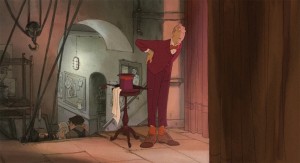An unfilmed screenplay has suddenly found a big screen adaptation. Jacques Tati wrote a screenplay before his death called L’illusioniste. It has been directed by world renowned cartoonist Sylvian Chomet. It is more like an ode to a daughter he had abandoned.
It has been 54 years since he wrote this script and it will be an animated film. It will have its premier at the Berlin Film Festival next month. The film will still overshadow a story of pain and scandal in the life of the comedian.
Now there is a custody battle on who needs to be given credit for the film. The script of Illusionist stems from the shame Tati had faced when he abandoned his daughter. Chomet is being accused of attempting to paint out their painful family legacy again.
“The sabotaging of Tati’s original L’illusionniste script, without recognising his troubled intentions, so that it resembles little more than a grotesque, eclectic, nostalgic homage to its author is the most disrespectful act,” claims Richard McDonald, Tati’s grandson, in a letter to the Observer.
Helga and her three children are the only surviving descendants of the star who created movie like Mon Oncle and Monsieur Hulot’s Holiday.

Helga’s story was kept quiet during her childhood to protect her father’s reputation, came to light when news of Chomet’s plans for the film was made public and Richard McDonald traveled to Northumberland where the film was being made.
Jacque Tati had met Helga’s Austrian mother Herta Schiel when she and her sister were working with him in music hall theatre in Paris during the German Occupation. Tati’s Sister Nathalie a wealthy businesswoman advised him not to marry. Eventually Herta was persuaded to sign a legal document releasing the performer from his duties as a father in return for money and she left the country with her baby, going on to marry another man.
Tati’s treatment of Herta and her child was not taken too well by many of the people in the theatrical circles. Everyone took the young woman’s side and left Tati in the cold.
Tati was forced to leave the theatre for a while, working first in Berlin and then living in seclusion in the village of Sainte Severe sure Indre which later became the insipiration for his 1949 film Jour de Fete. It is still regarded as one of the most influential films in French Cinema.
Helga on the other hand saw her father on posters and cinema screens all over Europe. She even tried to reach him. But all the shame that was caused by abandoning Helga made it difficult for Tati to reply to her mails. Later the young Helga took a job in Paris but she never got to meet her father. But there were several confirmations of her abandonment by many of her mother’s colleagues.
She trained as a dancer and went on to marry Norman McDonald the Englishman she later married.
Today her son describes her as a much loved grandmother and argues that the least she deserves is respectful acknowledgement. Hopefully this affirmation will change the tide of the film in its favor.







Sadly Chomet’s treatment of this inherently emotional and compelling tale seems to take one fathers guilt (tati’s),to his estranged daughter, and stolen and repackaged by another wayward father (Chomet) to his own ostracised daughter as a second hand show of affection.
read here for further details:
http://news.scotsman.com/movies/Interview-Sylvain-Chomet-film-director.6358987.jp#5308312
And for the truth:
http://blogs.suntimes.com/ebert/pages-for-twitter/the-shame-of-jacques-tati.html
Chomet’s point-blank refusal to acknowledge any existing family seems disingenious to the point of stupidity. Could it be, as this observer suspects, there are descrepency’s over the authenticity of how he (Chomet) came about this script, and therefore the overall legitimacy of how it to be in his hands in the first instance? Why else persistently deny the existence of Tati’s remaining family members?